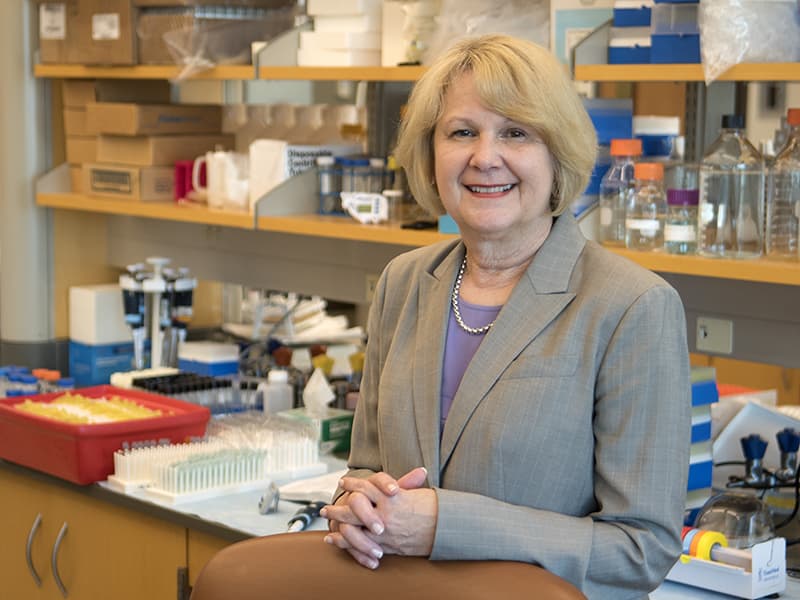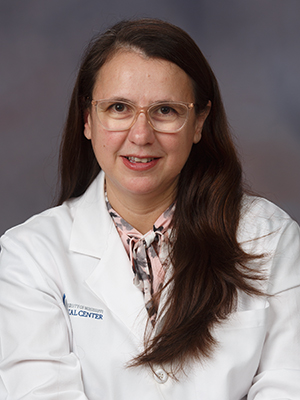Perinatal center to boost basic, clinical research

A new award to the University of Mississippi Medical Center will help create the Mississippi Center for Excellence in Perinatal Research.
Dr. Jane Reckelhoff, professor and chair of biochemistry, will direct the CEPR. Funded by a five-year, $11 million award from the National Institutes of General Medical Sciences, the CEPR will study disease states that arise during gestation or early post-natal development that result in persistent health conditions in either mother or offspring, or both, Reckelhoff said.
Perinatal research includes a “whole gamut of diseases associated with adverse pregnancies,” Reckelhoff said. There are conditions usually associated with pregnancy and birth, like pre-eclampsia or premature birth. However, evidence suggests that some instances of obesity, hypertension, diabetes, cardiovascular and renal diseases can be traced to perinatal developmental effects.
“There is evidence to suggest that [some cases of] chronic diseases have a developmental origin,” Reckelhoff said, when conditions in the womb have a long-term influence on health.
“Cardiovascular disease is the primary cause of death in women,” she said. “This research is really important for Mississippi in particular because our state has among the highest incidences of these conditions.”
The CEPR is supported by the Centers of Biomedical Research Excellence, a National Institutes of Health program. COBRE recipients build a multidisciplinary center focused on a thematic research topic which enhances their research capacity.
Research capacity refers broadly to two areas: infrastructure, like new laboratory equipment and resources, and human capital. Within a COBRE, divisions called Cores oversee these functions.
The Mentoring and Education core will support “junior faculty collecting pre-clinical data or preliminary data that they can use for an independent research proposal,” Reckelhoff said. Experienced faculty will mentor the newer investigators while they gain the footing needed to attain competitive grant support.
Dr. Heather Drummond, professor of physiology and biophysics, will oversee the research resources core that will help facilitate the new and future projects. Dr. Barbara Alexander, professor of physiology and biophysics, will direct basic science research, and Dr. Babbette LaMarca, professor of pharmacology and toxicology, will direct clinical Science research.
The CEPR’s first three projects include basic, clinical and population studies.
Dr. Licy Yanes Cardozo, assistant professor of medicine and biochemistry, will use an animal model to study polycystic ovary syndrome. PCOS is the most common endocrine disorder in young women, characterized by hormone imbalance and low fertility.

“These women also have metabolic disorders that are very difficult to treat,” said Yanes Cardozo, an endocrinologist.
While the cause of PCOS isn’t known, Yanes Cardozo and others suspect it’s the result of developmental programming.
Yanes Cardozo’s goal is to find out if the increased androgens, such as testosterone, play a role in the obesity, hypertension and insulin resistance that many PCOS patients experience. Her hypothesis is that the excess androgens synthesized in the adipose tissue activate an enzyme that produces more androgens, setting up a positive feedback loop, she said.
“It is frustrating that we do not have much to offer these patients in terms of treatment,” Yanes Cardozo said. The hope is that by determining how this enzyme influences hormonal balance, researchers can develop “new tools to block this enzyme and find ways to treat PCOS and the associated metabolic diseases,” she said.
Dr. Bernadette Grayson, assistant professor of neurobiology and anatomical sciences, studies the effects of pre-pregnancy bariatric surgery, including intra-uterine growth restriction and changes in maternal testosterone. Her proposal will explore if elevated androgens increase the risk of cardio-metabolic dysfunction in the offspring.
Dr. Aimee Parnell, assistant professor of pediatrics-cardiology, will study ways to use telehealth to improve critical congenital heart disease screenings in rural Mississippi. She will also study if a mother’s pre-existing health conditions such as diabetes and obesity increase the risk for heart defects in their children.
Each COBRE must have an experienced principal investigator with research expertise central to the center’s theme. Reckelhoff, director of UMMC’s Women’s Health Research Center, studies sex-related differences in hypertension and renal disease.
“This research is important because women’s health and the future health of their children is important,” Reckelhoff said.
“UMMC is well suited to train new researchers and leaders in this field,” said Dr. Joey Granger, professor of physiology and biophysics who studies preeclampsia. “While we have a small nucleus of nationally and internationally investigators that work in this area, this COBRE award will allow UMMC to build on our success and become world leaders in maternal and perinatal research.”


